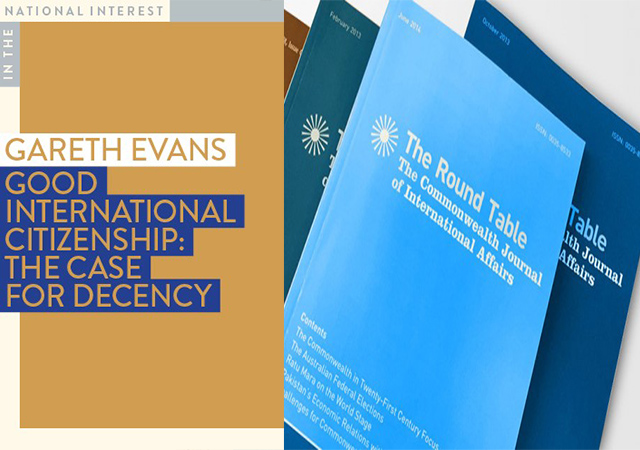
[This is an excerpt from an article in The Round Table Journal: The Commonwealth Journal of International Affairs.]
During this era of intensified nationalism and growing geopolitical uncertainties it is unusual for a leader of foreign policy to publish a book focused on their own nation’s ethical and political responsibilities to other countries. Insecurity is being intensified by the current post-WW2 peak in violent conflict, expanding military spending to the highest level since 1945, and the intensified anxiety everywhere caused by the global COVID-19 pandemic. Therefore, the publication of this inspirational book is particularly timely.
Gareth Evans was Australia’s most outstanding foreign minister since 1945. When I made this remark during my retirement address to the Australian House of Representatives in 1996, Gareth interjected ‘What about before the War?’ He is justifiably proud of having held the position for eight years (1988 to 1996). His authority as both a national and global leader and scholar of international relations is globally acknowledged, partly because of roles such as co-chairing the International Commission on Intervention and State Sovereignty which initiated the ‘responsibility to protect’ concept (2001) and the Australian-Japan International Commission on Nuclear Non-Proliferation and Disarmament (2009). One of his most notable characteristics is articulated in the title of his autobiography Incorrigible Optimist: A Political Memoir.
Book review: Australia and the world 1920-1930: Documents on Australian foreign policy
Australia: Geographical basis of foreign policy
This most recent book is a delight and inspiration. His first paragraph describes what he means by ‘good international citizenship’: … ‘above all else caring about other people’s suffering and doing everything reasonably possible to prevent and alleviate it … in areas such as humanitarian relief and development assistance, human rights and environmental protection, arms control, peacemaking and peacekeeping’.
He identifies four practical benchmarks with which to evaluate good international citizenship: being a generous aid donor; protecting and evaluating universal human rights; seeking international peace and security; and collaborating with attempts to solve the existential threats posed by pandemics, global warming, and nuclear war. He recognises that the foundations for these moral obligations differ depending on spiritual or philosophical belief but asserts reasonably that it is striking how similar are the central moral positions of most religions and philosophies. They point in the same direction – respect for the common humanity of all peoples.
This does not invalidate the core position of foreign policy, advancing the national interest. It does however require thinking carefully about what is the national interest? It certainly includes seeking security and prosperity for all residents, but also three kinds of return: progress on issues of international concern such as reducing greenhouse gas emissions, controlling pandemics, and abolishing nuclear weapons. Second, reciprocity: if we help you, you are more likely to help us when we need it. Third, the benefits of having a good reputation. In diplomacy a reputation for cooperation increases persuasive effectiveness. Good foreign policy must extend to ‘purposes beyond ourselves’ as eminent theorist Hedley Bull wrote in 1957.
Evans is rigorously analytical when evaluating Australia against these standards. He recognises that Australian aid has declined faster during the last decade than that of any of the other rich OECD donor. At the end of the conservative governments’ terms in 2021–22 it had plunged to 0.21% of gross national income.
In relation to human rights Australia is notable in being an English-speaking country which does not have a national Bill of Rights. Despite this chasm there have been advances in recognition of Indigenous land rights, steps towards gender equality, and recognition of same-sex marriage. However, external policy has been mixed with acceptance of refugees in earlier post-war decades being replaced by the ‘lamentable’ refusal to accept asylum seekers who have arrived by boat during recent decades.
Australia has always been a supporter of the United Nations. This was especially strong when Evans was Foreign Minister, including through the publication of a 250-page book on peacemaking. Australia ‘was the driving force behind the process which brought peace to Cambodia’ at the start of the nineties. However, excessively influenced by US pressure, Australia has been an active participant in wars which had nothing to do with the national interest, including joining in the illegal invasion of Iraq in 2003.
There are full discussions of Australian engagement with the existential threats. He quotes Jeffrey Sacks’ UN-backed Sustainable Development Report 2021 which ‘scored Australia last out of 193 UN member states for our performance on the “climate action” goal’. This is a classic case of a government failure to discern the national interest.
John Langmore is with the Initiative for Peacebuilding, University of Melbourne.
Good international citizenship: the case for decency by Gareth Evans, (In the National Interest Series), Melbourne, Monash University Publishing, 2022.



